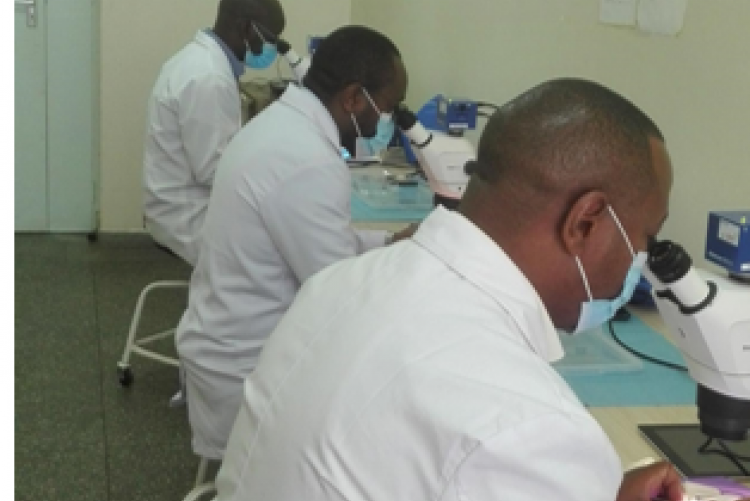Simulated ocular surgery training unit developed at the Department of Ophthalmology
The Department of Ophthalmology now has a simulated ocular surgery unit to augment our surgical training program. This unit was built on evidence from research we conducted which found that simulation-based training allows trainees to acquire surgical competency faster and improves patient safety.
Post-graduate students performing simulated surgery
We conducted two randomized controlled trials; one in cataract surgery and one in glaucoma surgery. Five University hospital training institutions in Kenya, Uganda, Tanzania, Zimbabwe and South Africa participated. We evaluated whether adding simulation-based surgical training to conventional training improves the acquisition of surgical skills by trainees. Postgraduate students were randomized into 2 groups; one received concentrated 1-week simulated training in Cape Town, South Africa and continued with our regular training while the other group received the regular training. Finally, those who got regular training also got a chance to go to Cape Town after one year to allow for fair treatment of both groups.
In the cataract study, the group that received simulation-based training went on to perform more surgeries with less complications over the next one year (see publication). In the glaucoma study the group that received simulation-based training felt more confident and did more surgeries with greater success (see publication)
With this evidence we partnered with the London School of Hygiene & Tropical Medicine (LSHTM), Ulverscroft Foundation, Christoffel Blindmission (CBM), and other local contributors, and developed a simulation unit with 4 training stations like the one in Cape Town.
Figure 1. Postgraduates training in the simulation ocular surgery unit at the Department of Ophthalmology. [Photos used with permission of the trainees]
Post-graduate students performing simulated surgery
Simulated ocular surgery training unit developed at the Department of Ophthalmology
The Department of Ophthalmology now has a simulated ocular surgery unit to augment our surgical training program. This unit was built on evidence from research we conducted which found that simulation-based training allows trainees to acquire surgical competency faster and improves patient safety.
We conducted two randomized controlled trials; one in cataract surgery and one in glaucoma surgery. Five University hospital training institutions in Kenya, Uganda, Tanzania, Zimbabwe and South Africa participated. We evaluated whether adding simulation-based surgical training to conventional training improves the acquisition of surgical skills by trainees. Postgraduate students were randomized into 2 groups; one received concentrated 1-week simulated training in Cape Town, South Africa and continued with our regular training while the other group received the regular training. Finally, those who got regular training also got a chance to go to Cape Town after one year to allow for fair treatment of both groups.
In the cataract study, the group that received simulation-based training went on to perform more surgeries with less complications over the next one year (see publication). In the glaucoma study the group that received simulation-based training felt more confident and did more surgeries with greater success (see publication)
With this evidence we partnered with the London School of Hygiene & Tropical Medicine (LSHTM), Ulverscroft Foundation, Christoffel Blindmission (CBM), and other local contributors, and developed a simulation unit with 4 training stations like the one in Cape Town.
Figure 1. Postgraduates training in the simulation ocular surgery unit at the Department of Ophthalmology. [Photos used with permission of the trainees]
- Log in to post comments

